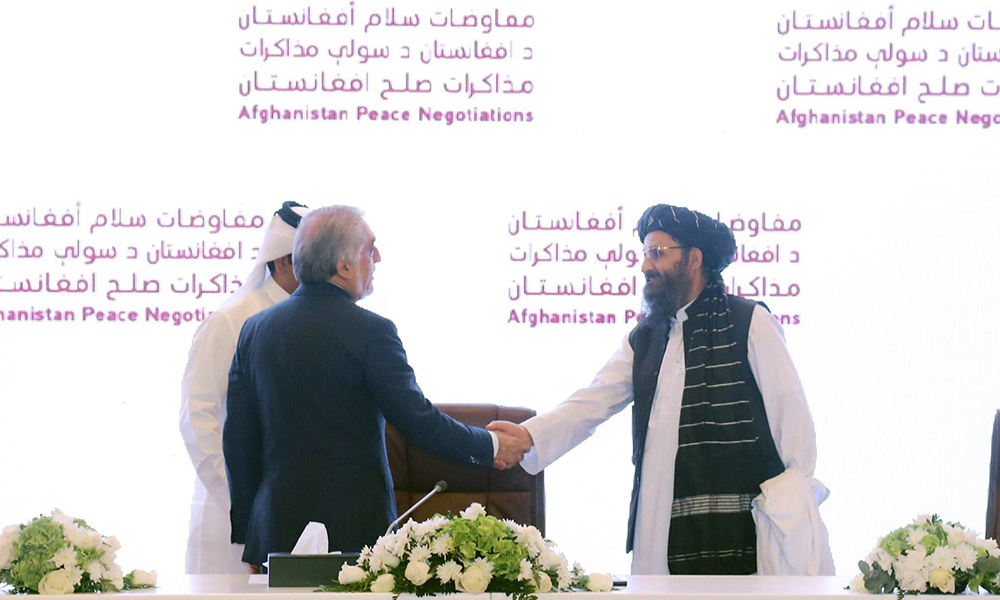Latest News
Talks teams in Doha agree to continue negotiations

While a ceasefire is still elusive, two days of talks in Doha, Qatar, between the Afghan government and Taliban delegations wrapped up on a somewhat positive note after both sides agreed to continue negotiations.
Delegates from both sides met late Sunday night – again behind closed doors.
Abdullah Abdullah, Chairman of the High Council for National Reconciliation (HCNR), who headed the Afghan Republic’s team assured people that government is seriously committed to working for peace in the country and that it will continue talks in the coming weeks.
“We concluded the two days of intensive talks with the Taliban in Doha. We exchanged views on core issues concerning the two parties. We listened to each other’s point of views, interpretations & the ways forward to end the conflict through a comprehensive political settlement,” Abdullah tweeted.
“In the joint statement issued at the conclusion of the talks, we agreed to continue the talks, seek a political settlement to the current crisis, avoid civilian casualties, facilitate humanitarian assistance & medical supplies to tackle Covid-19 pandemic.
“During the talks we reiterated the republic’s commitment to a just & durable peace, an end to violence & resolving the current crisis through a negotiated political settlement.
“We thank all our partners, especially the State of Qatar for hosting & supporting the peace talks,” he said.
The Taliban’s spokesman Mohammad Naeem also tweeted a statement to this effect.
While it was hoped that a temporary ceasefire between the Taliban and the government would emerge from this round of talks, the two sides appear to not have discussed the issue of an Eid ul-Adha ceasefire.
The meetings were closed to the media and except for the delegations from the Afghan Republic and the Taliban, the only other participant was the Qatari special envoy.
The meetings come at a critical juncture in Afghanistan’s history. With the withdrawal process of foreign troops from the country almost complete, the Taliban has ramped up attacks across the country and seized dozens of districts.
Latest News
Girls’ education is a ‘vital issue’ for Afghanistan: Karzai

Former president Hamid Karzai said in a meeting with Iran’s ambassador and special representative, Hassan Kazemi Qomi, that education of girls was a “vital issue” for Afghanistan.
Karzai said he appreciated Iran’s cooperation and its standing with the Afghan people, especially Iran’s contributions to education in Afghanistan.
During the meeting, Karzai said peace and stability in the region are in the interest of all regional countries.
Latest News
Uzbekistan’s humanitarian aid arrives in Balkh

A shipment of humanitarian aid from Uzbekistan was handed over on Thursday to the local officials of Balkh province in the trade port of Hairatan.
Local authorities said the aid, which includes flour, oil, wheat, sugar and meat, has been handed over by Uzbekistan’s Surkhandarya governor to the governor of Balkh.
The governor of Surkhandarya stated the purpose of sending this aid was to support the people of Afghanistan and stressed the need for the development of good relations between the two countries.
Latest News
Afghanistan’s problems caused more damage to Pakistan than 3 wars with India: Durrani

Islamabad’s special envoy for Afghanistan Asif Durrani said on Wednesday that Pakistan has suffered more due to Afghanistan’s internal situation than Pakistan has suffered in three wars with India in terms of blood spilt and finances drained.
Durrani said at a one-day International Conference titled “Pakistan in the Emerging Geopolitical Landscape”, which was organized by the Institute of Strategic Studies Islamabad (ISSI) and the German Friedrich Ebert Stiftung (FES), that over 80,000 Pakistanis died in the two decades of the War on Terror and that his country was still counting its dead and injured.
“After the withdrawal of NATO forces, it was hoped that peace in Afghanistan would bring peace to the region. However, such expectations were short-lived,” he said.
He also stated that attacks by the Tehreek-e-Taliban Pakistan (TTP) militant group on Pakistan’s border areas increased by 65 percent, while suicide attacks increased by 500 percent.
“The TTP’s enhanced attacks on Pakistan while using Afghan soil have been a serious concern for Pakistan. Another worrying aspect is the participation of Afghan nationals in these attacks,” he said.
Durrani also said Pakistan had suffered geopolitically since the Soviet Union invaded the neighboring country.
“The post-9/11 world order has negatively impacted Pakistan. Apart from losing 80,000 citizens’ lives, including 8,000 law enforcement agency personnel, the country’s economic opportunity cost is estimated at $150 billion,” Durrani said.
Talking about the future outlook for Pakistan in the regional context, Durrani said that while “our eastern neighbor is likely to continue with its anti-Pakistan pursuits, the western border poses an avoidable irritant in the short to medium term.”
However, he said Pakistan can overcome its difficulties with Afghanistan, including the TTP challenge.
-

 Latest News5 days ago
Latest News5 days agoPakistan’s frontiers minister stresses ‘dignified’ return of Afghan refugees
-

 Regional4 days ago
Regional4 days agoIranian president lands in Pakistan for three-day visit to mend ties
-

 Latest News3 days ago
Latest News3 days agoRashid Khan named AWCC’s brand ambassador
-

 Climate Change5 days ago
Climate Change5 days agoMassive river flooding expected in China, threatening millions
-

 Latest News5 days ago
Latest News5 days agoChinese keen to invest in Panjshir-Kabul water conduit project
-

 World5 days ago
World5 days agoTwo Japan navy helicopters crash, one body found, 7 missing
-

 Sport4 days ago
Sport4 days agoKolkata beat Bengaluru by one run in IPL as Kohli fumes at dismissal
-

 Sport4 days ago
Sport4 days agoACL: Aino Mina 3-0 Istiqlal Kabul; Attack Energy 3-0 Khadim
























